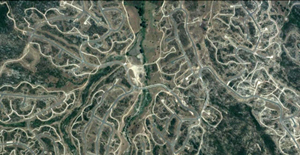
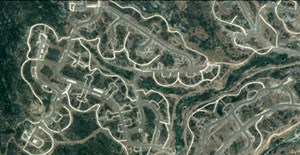
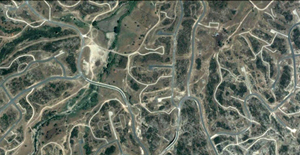
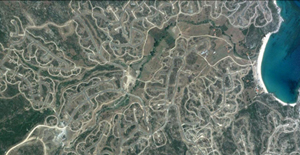
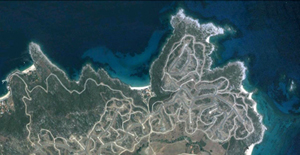
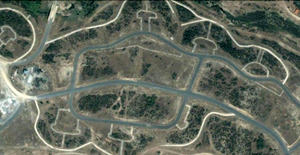
In 40oN and 24oE, in the North of Greece exists the Invisible City.
It is a network of roads, bridges, stairs and other urban elements that form an open labyrinth. Paradoxically one has to cross it to go to one of the most quiet, most beautiful and until now not commercially developed beaches.
There is a hazy background surrounding the story of this Invisible City. For whom, when, how and why was it built?
Invisible_City_NE from Kostas Tzimoulis on Vimeo.
After visiting Kriaritsi (Invisible City), meeting with local people and searching the web, several questions were raised.
Most of the locals don’t know many things about it and the future of this situation is not clear for them. There are rumours that the whole area (a total land of 13,300 stremma) belongs to the Greek state and has been given to policemen and judges to build their summer homes.
Also there is a construction company that sells land at Kriaritsi as part of a settlement that called Aghios Pavlos, The settlement’s planning and infrastructure are considered of the highest standard for Greece and Southeast Europe. Today all infrastructure work (which is funded by the settlement itself) is already completed: airlift hub in connection with the national junction, five bridges of 700 m length inside the village, 75 km of asphalt road (of 6 m or 3 m width), modern telecommunications network, power transmission grid, two water supply systems and an excellent rainwater system and modern drainage system for the activated sludge. There is also a modern mechanism that guarantees full protection of the village from wildfires as they advertise on the web at the website (www.kriaritsi.gr) .
There is also the resistance of the citizens from the wider area of Halkidiki, who express their views through a “citizens movements”. They react to the development of the area and connect Kriaritsi with one of the monasteries of Mount Athos (Holy Mountain). Monasteries are also involved in many scandals of corruption that have to do with properties that supposedly “belong” to them. (www.chalkidiki-sos.blogspot.com).
Several social networks are starting to find out what is going on at Kriaritsi in terms of ‘free’ camping, much like they do for other places in Greece such as http://www.iliosporoi.net/ ,http://www.myspace.com/reclaimthebeachfestival,
http://freecampgr.blogspot.com/. Many organise actions, events and festivals in Greece to support free camping in an attempt to legalize it.
For thousands of years, humans lived close to the nature and still for most of them the freedom to spend some time in it remains a fundamental and obvious right.
Nevertheless, in Greece according to the law concerning “Settings for tourism and other regulations”, all natural sites, public places, forests, seashores, are seen as subjects of touristic exploitation. In this direction, free camping, even in private properties is prohibited. The punishment for lawbreakers is imprisonment and a fine up to 150 euros.
On the contrary, usually those who participate in the turism and its market and build in the forest, seashores and public areas experience tolerance or even support and encouragement of the authorities.
The current law is based on a previous law created during the dictatorship in Greece in 1974. At that time – a law prohibiting camping was used against Romas and hippies. Now, it is used to convert the public open spaces into a property of the state or of the local authorities. This is an important step towards leasing these spaces to private individuals and corporations instead of offering the land to the community for a free use. Through this leasing, private corporations create organized camping sites and they set rental rates for every square meter one could use, see or stand on…
It is obvious that this ban is absurd and it comes to support an effort to economically exploit all natural sites in all possible ways. This ban makes all the nature visitors to be tourists which traps them to a particular model of tourism that protects the economic interests of the touristic industry. So, it seems that being in nature is seen as a luxury one has to pay for in private corporations.
Free camping entails an intensive contact with nature. This fact together with the relationships developed among the campers in the communities created within camping sites are some of the reasons why to choose to reside in such places. The lack of regulated services (garbage collection, toilet, etc.) promotes a shared responsibility, self-regulation and self-organization. As long as one respects and protects the nature, everybody should have free access to it and be able to freely use it.
All beaches, seas, mountains, forests, rivers, skies of this world belong to everyone.
Untitled from Kostas Tzimoulis on Vimeo.
[...] have been doing a series of presentations for The Object Lag. Presentations by Lauren Alexander and Kostas Tzimoulis on May 23rd and Frederik Gruyearts and Anna Hoetjes on May 30th dealt with the concept of [...]
Just saw your video…”Fantastic”. Very well made. Camping should “FREE”. If their are charges, it should be for keeping the property clean and preserved. The Government is trying to make $$$ because, they are the ones causing the defaults in your country. I am asking the same question that you are asking, “what’s up with the land” They have gotten the entire structure done, but no houses. I own a parcel of land on Kriaritsi with my wife, (who is Greek) and all we do it pay the tax, the lawyers and I guess, the Government. We have waited for over 30 years and still, our hands are in the air. I would love to someday build there and if not, maybe camp for a weekend or two. Good luck to you and your followers. By the way, there is KNOWONE who will answer questions about the grounds or housing, as to when we can build. Sorry to say, but Church and State will never really mix together. They both steal from one another